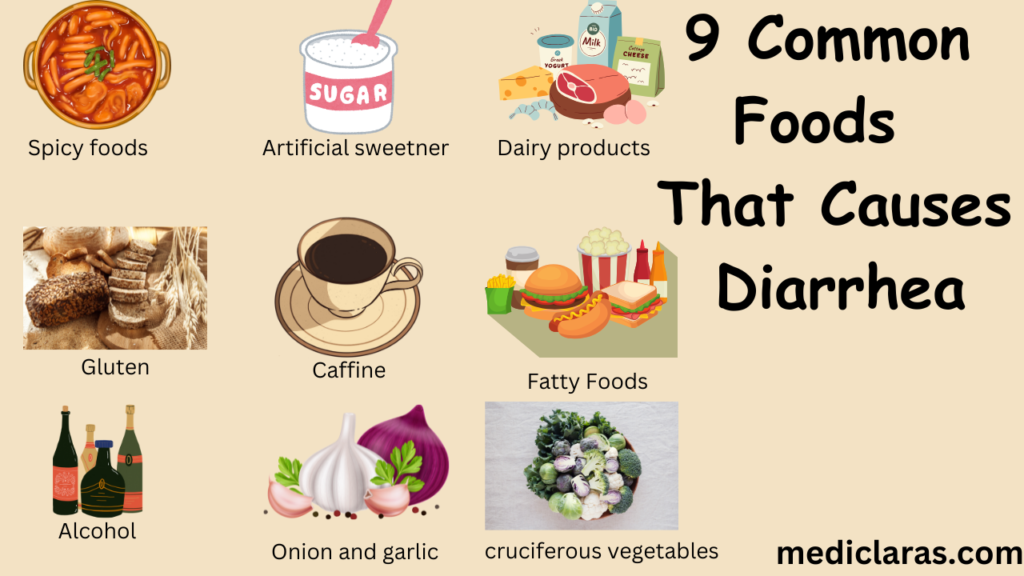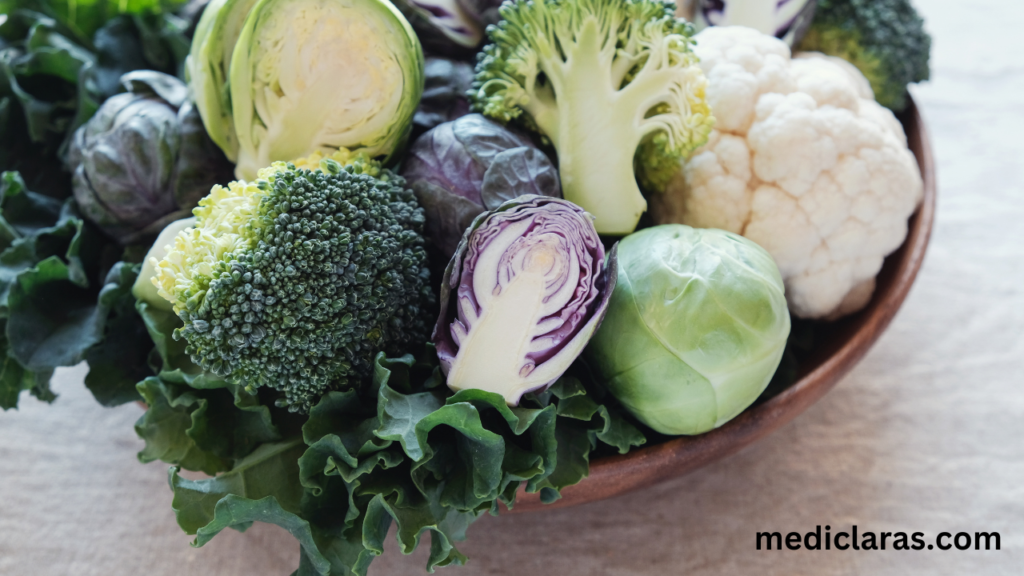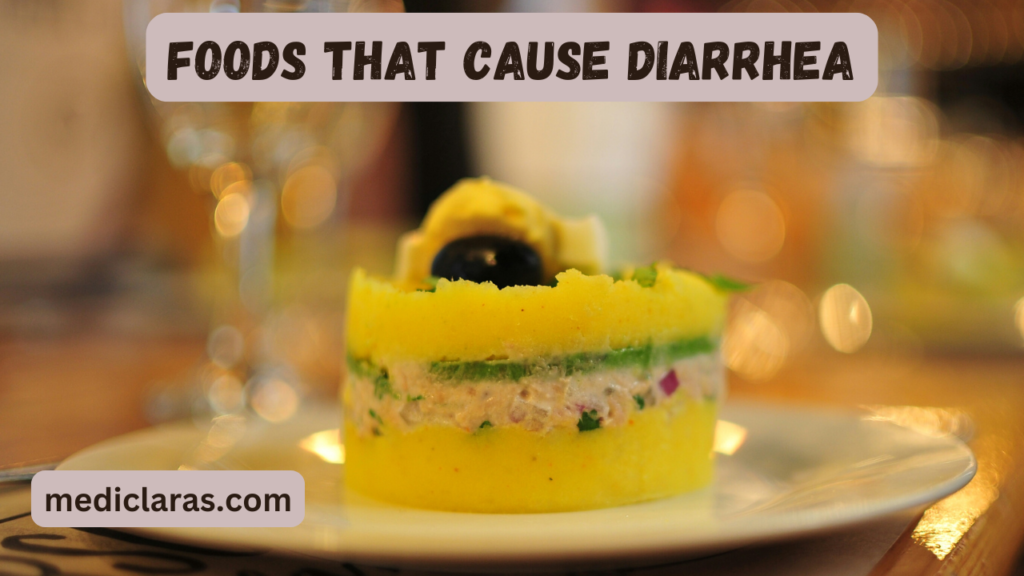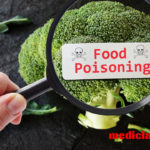Foods that cause Diarrhea
There are some types of foods that can lead to watery diarrhea or have
adverse effects on the digestive system, but this is usually due to food
intolerance. Dairy products, foods with spices, or oily foods are the
common causes of diarrhea.
In this article, we discuss 9 of the most common foods that cause
diarrhea, what can be done about them ,and when you should seek
medical attention.
What is diarrhea
Diarrhea is characterized by frequently passing loose or watery stool in a
day. Some contributing factors of diarrhea are infection, illness or food
intolerances.
Diarrhea can be classified as acute or chronic.
Acute diarrhea refers to when a person has it for 1 to 2 This type of
diarrhea occurs due to bacterial or viral infections you got from
something you ate or drank.
Chronic diarrhea occurs when a person with the condition lasts longer
than 3 to 4 weeks . Chronic diarrhea is associated with some conditions
such as:
Irritable bowel syndrome
Inflammatory bowel diseases
Symptoms associated with Diarrhea
Diarrhea can be defined primarily by the presence of loose or watery
stool. It also accompanied by following symptoms:
● Abdominal cramping and bloating
● Nausea
● Fever
● Vomiting
● Dehydration
● Loss of appetite
● Weakness
● Dry skin
● Headache
Some common symptoms typically do not require a physician visit
unless they persist for more than a few days.
Foods that cause Diarrhea
Foods that cause diarrhea vary from person to person. For example
diarrhea may occur due to if a person has:
Food intolerances
Adverse reactions to foods
Inadequate nutrient absorption
It is observed that some foods can still cause diarrhea even if you don’t
have Food sensitivity.

1.Peppery Foods
The frequent causes of food induced diarrhea are some spicy foods like
chili peppers and different blended curries, especially the spiced
ingredients that your body is not used to.
Chili pepper contains a chemical compound called capsaicin. Although
research indicates that it has some diverse health benefits like relief in
pain and treating arthritis, it is still a strong irritant that can irritate the
stomach lining while digestion.
If capsaicin eaten in large quantities it can cause :
Watery diarrhea
Pain in abdomen
Nausea or vomiting If such types of foods cause diarrhea try to avoid them by using their
alternatives.
2.Artificial sweeteners
Artificial sweeteners commonly have laxative effects, because they draw
water into the intestine , irritate the digestive tract and cause diarrhea.
Foods that usually have artificial sweeteners are following:
Sugarless candies and sweets
Chewing gum
Dietary beverages like diet soda
Certain toothpick and mouthwash
Low sugar items like ketchup and coffee cream.
3.Fatty or fried foods
Digestive problems can arise with the consumption of high fat foods. Our
body faces difficulties in the digestion and absorption of high fat food
items.
Dietary fat stimulates bile production and increases the degree of water
in the small intestine. The combination of these factors can cause
inefficient digestion or diarrhea ,in particular.
4.Lactose
Lactose intolerance develops , if a person has diarrhea after drinking
milk or consuming dairy products. Many people are unaware that they
have lactose intolerance.
Our body has certain enzymes that break down the sugars in dairy
products. When the body is missing that enzyme, lactose intolerance
develops. Rather than breaking these sugars ,your body pushes these
sugars out rapidly ,leading to diarrhea.
There are several alternatives to cow milk available in the market, such
as:
Non – lactose dairy milk
Oat milk
Almond milk
Soy milk
Cashew milk
5.Foods with Gluten
Gluten sensitivity can occur to different degrees for many individuals. It
can occur by consuming foods that contain gluten protein such as wheat
, rye , and barley . These foods can trigger diarrhea in individuals with
celiac disease. In this disease a severe allergic reaction to gluten occurs
that affects an individual immune system to the point that it produces
damage in the small intestine. This can lead to diarrhea.
People without celiac disease also experience complications with gluten
intake. If a person experiences gluten intolerance, it is best for that
person to consult a doctor for proper testing before going on a gluten
free diet.
6.Caffeinated beverages
As coffee contains caffeine, which is a stimulant that can increase mental
alertness and speed up digestion. Coffee also has a laxative impact
when users add additional digestive stimulants like milk, sugar
alternatives, or creams.
Apart from coffee ,other foods and beverages that contain caffeine may
also result in diarrhea or soft stools. For example, caffeine found
naturally in chocolate therefore any chocolate flavored foods may have a
hidden caffeine content. Some common food and beverages that have
caffeine are :
Cola drinks
Green tea
Black tea
Energy drinks
Hot chocolate
7.Some Vegetables
Consumption of some vegetables like cabbage , cauliflower, garlic and
onion cause diarrhea in some individuals. These are also called
cruciferous veggies.
Numerous health advantages of these vegetables may aid in the battle
against oxidative stress and inflammation.
However, because of their high fiber content ,the digestive tract may
have problems processing them, particularly if a person has
inflammatory bowel disease.
Garlic and onion are also observed to exacerbate the symptoms of
irritable bowel syndrome , a disorder causing symptoms such as
diarrhea, abdominal pain and cramping. These two vegetables are
classified as high FODMAP( fermentable oligosaccharides,
disaccharides, monosaccharaides, and polyols ) foods. This category of
carbohydrates can cause diarrhea in some individuals.
To replace garlic and onion from your diet ,use celery or fennel. They
have less risk of diarrhea or gas and may provide similar flavor to food.

8.Alcoholic beverages
Alcohol consumption, particularly wine or beer , might cause loose stool
the next day. Alcohol may irritate and cause inflammation of the
digestive tract which can lead to diarrhea. Eliminate alcohol and check to
see if diarrhea improves.
9.Certain Fruits
Although fructose is a naturally occurring sugar in fruit, the IFFGF states
that eating too many fruits can result in diarrhea.
Ways to manage diarrhea
The underlying reason and whether diarrhea is acute or chronic will
determine how it is treated .
Some home remedies and over the counter medications may be used as
a part of the treatment, including:
● To avoid dehydration consume a lot of liquids or juices
● Use antidiarrheal drugs , such as loperamide and bismuth sub
salicylate, over the counter drugs
● Consume BRAT ( Banana,Rice,Apple ,Toast) diet
● Eliminating the diet could be helpful if you are unsure of which
foods are causing your diarrhea or digestive issues.
This involves cutting out specific items to see whether your symptoms go
better. This might assist you in figuring out the effects of various foods
on your body .
When to seek medical attention
Typically acute diarrhea resolves on its own in a few days. But the
chronic diarrhea that lasts greater than 7 days may get worse or come
with other symptoms that indicate some health problem that needs
medical care. You should see your healthcare provider if you have:
Severe abdominal pain
Blood in stool
Severe vomiting
Dehydration symptoms like dry skin, dizziness and fatigue.
Summary
High fat foods, spicy foods, dairy products and artificial sweeteners can
cause digestive system irritation leading to diarrhea. For individuals with
food sensitivities, gluten and lactose intolerance can cause diarrhea.
For Prevention of diarrhea, it is essential to identify the foods that cause
diarrhea. Symptoms can also be lessened by following some home
remedies and taking over the counter medications. If diarrhea persists
more than 2 days ,or bloody stool passes , consult the doctor
immediately.



